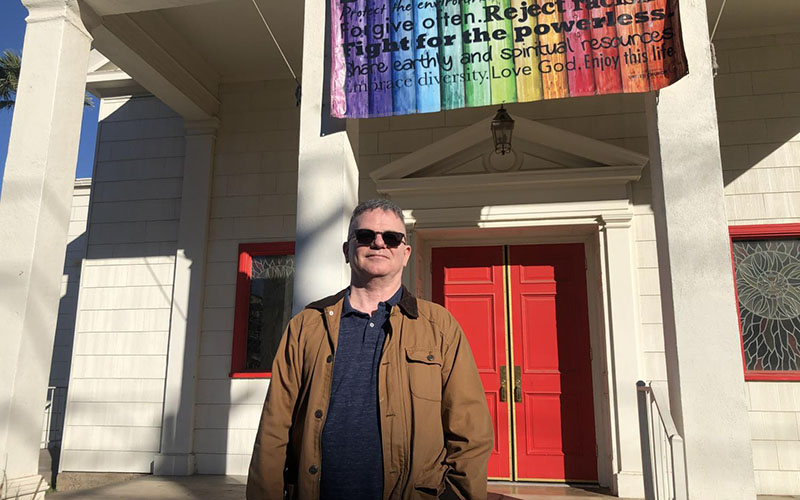
Attorney Brendan Mahoney advocated for a Phoenix ordinance prohibiting discrimination on the basis of sexual orientation – just as the law already did for race, sex, marital status and religion. (Photo by Will Stone/KJZZ)
PHOENIX – Brendan Mahoney was one of those lawyers gay people routinely called when they were fired from a job or refused a room because of their sexual orientation.
He would explain the reality of the law in Arizona: “There are no federal protections, no state or city protections. Your best solution is to get involved and change the law.”
Eventually, Mahoney, who is gay, took his own advice. He went to work for Phoenix and advocated for a city ordinance prohibiting discrimination on the basis of sexual orientation. The ordinance would apply to housing, employment and other public accommodations – just as the law already did for race, sex, marital status and religion.
Despite vigorous opposition, the City Council approved the ordinance in 2013. But the law has been challenged by the owners of a calligraphy shop who say they can’t in good conscience follow the ordinance because they are Christian.
The Arizona Supreme Court heard arguments in the case Tuesday.
A divisive issue
Mahoney said he got involved in the discrimination issue thinking that “things had changed, that there was broad support in the community for this and that our politicians were just behind. They were afraid of the attacks that would inevitably come from the conservatives.”
Opposition was fierce and on full display during the 2013 public hearing leading up to the City Council’s 5-3 vote.
Those against the proposal, which also applied to gender identity or expression and disability, called it “government overreach” and an “attack on the innocence of our society.”
“Now you are going to discriminate against that person because they have religious convictions,” one Phoenix resident told council members.
Others directly cited religion when voicing their concern about the measure.
“He (God) sends you to punish evildoers and praise those who do good – not to switch that around,” another man said.
But the measure ultimately prevailed, with then-Mayor Greg Stanton casting the deciding vote. That prompted roaring applause from advocates who had waited through hours of painful public testimony.
Mahoney said the law has made a huge difference in the lives of LGBTQ people, calling its impact profound.
“We have had no uproar about, ‘Oh my God, you are ruining our business, we’re going to have to lay people off,’ and the parade of horribles that gets tossed out.”
Free speech, religious rights

Breanna Koski (left) and Joanna Duka , who own Brush & Nib Studio, say their Christian faith holds that marriage is between a man and woman. (Photo courtesy of Alliance Defending Freedom)
But Breanna Koski and Joanna Duka, owners of Brush & Nib Studio, which designs custom invitations for weddings and other events, say making an invitation for a same-sex wedding would violate their Christian belief that marriage is solely between a man and a woman.
“The government shouldn’t be telling artists what they can and can’t say,” Koski said. “We’re challenging this law not just for us, but for all artists to be able to create freely.”
She and Duka argue the ordinance violates their freedom of speech and religion and are asking the Arizona Supreme Court to deem it unenforceable against them. Violators can face thousands of dollars in penalties and possible jail time.
The Arizona Court of Appeals last year ruled against Brush & Nib, which is represented by Alliance Defending Freedom, the high-profile Christian law firm that represented a Colorado baker at the U.S. Supreme Court in 2017. The baker, Jack Phillips, had refused to make a cake for a same-sex wedding because of his religious beliefs.
The court ultimately ruled in favor of the baker but left the central question of the case – how to balance free speech with protections against discrimination – unresolved.
The issue is expected to end up back in the high court, and a handful of lawsuits related to providing services for same-sex weddings are moving through the nation’s lower courts in hopes of forcing the question.
– Video by Bryce Newberry/Cronkite News
Beyond religion
“The main question is, do you get to object to that kind of antidiscrimination law because it’s forcing you to convey a message?” said Ilya Shapiro of the Cato Institute, a conservative think tank that filed a brief supporting the business.
Shapiro argues Brush & Nib’s owners should have that right. He contends the owners don’t object to serving gay people, just using their artistic skills to support a same-sex wedding.
Shapiro believes the issue goes beyond religion.
“I personally don’t think it matters that their objection is based on their Christian faith. So, in theory then, could you force a Democratic public relations person to write a press release for a Donald Trump rally or something like that?”
Alliance Defending Freedom makes a similar argument.
“The rules should go the same way for other people,” attorney Jonathan Scruggs told KJZZ in November. “The government should not be forcing an LGBT web designer to create a website criticizing same sex marriage for a church, or to force a Muslim printer to design and create pamphlets promoting a synagogue’s religious service.”
Serving all customers
But attorneys for Phoenix argue the law doesn’t force the business to design messages proclaiming support for gay marriage, only to make the “standard wedding invitations that are otherwise identical to what they would make for a straight couple.”
“It’s not an answer to one type of discrimination to say, well, let’s have more discrimination,” said Jennifer Pizer, law and policy director for Lambda Legal.
“The point is, people operating businesses should be serving all customers without discrimination.”
Pizer’s group has joined other civil rights organizations in supporting the city’s position that there’s no principled way to differentiate discrimination based on sexual orientation from other classes like sex, race or even religion.
Once you start doing that, Pizer warned, “civil rights laws could become meaningless if constitutional rights are understood that way.”
The case has divided powerful forces in Arizona.
Attorney General Mark Brnovich and Republican leaders have filed briefs in support of Brush & Nib. Major employers and sport teams have sided with Phoenix.
“If their compelled-speech theory prevails, any business that engages in similarly expressive activities – photographers, artists, graphic designers – would be able to refuse services if providing those would effectively require them to state a message with which they disagree,” said Kaipo Mastumura, who teaches at ASU’s Sandra Day O’Connor College of Law.
He speculated the Arizona Supreme Court may try to rule narrowly on what counts as free speech.
“My guess is that the court would try as hard as possible to restrict the ruling.”
But Mastumura noted the lawsuit also challenges the Phoenix nondiscrimination rule on the grounds of religious freedom, which is related to another Arizona law.
“That’s based on this rationale that any time I am asked to perform a service that makes me complicit in a same sex wedding, my religious rights are being violated.”
He said that could make the ruling about many other services, ones that don’t necessarily intersect with free speech or “expressive conduct.”
One weakness in the case? Matsumura points out no one actually asked the shop owners to make an invitation for a same sex wedding.
“We don’t really know exactly what they would or would not do,” he said. “It’s unclear the extent to which Brush & Nib would actually be compelled under the law to express a particular message about same sex marriage.”
Connect with us on Facebook.